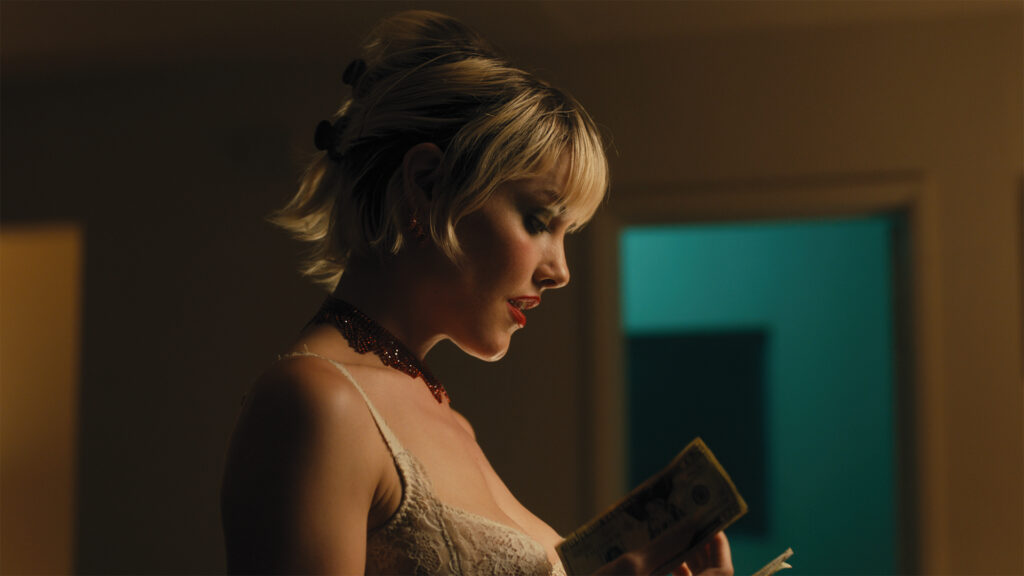An Ensemble Cast of Uniform Excellence and Powerful Imagery Throughout Drive ‘A Desert’
Joshua Erkman has absorbed his influences and taken them on like a second skin. Influence is funneled through idiosyncrasy, and ‘A Desert’ is more than the sum of its art house affectations.

On a recent episode of “Pure Cinema Podcast,” a program affiliated with Quentin Tarantino’s New Beverly Cinema at Los Angeles, California, host Elric Kane spoke with director and writer Joshua Erkman upon the release of the latter’s feature debut, “A Desert.” Messrs. Kane and Erkman were being cagey about its provenance or, rather, the specific picture on which it was predicated. Having watched this “sun-bleached neo-noir horror film,” I’m hard-pressed to pinpoint the source.
Alfred Hitchcock’s “Psycho” (1960), maybe: “A Desert” unfolds with jarring plot developments and includes a remote motel with a peculiar hotelier manning the front desk. The grunge, the grit, and the madness bred by isolation seen in Mr. Erkman’s picture are similar to that of Tobe Hooper’s infamous “Texas Chainsaw Massacre” (1974).
A film critic for Variety, Dennis Harvey, espied Mr. Erkman quoting from a James Landis thriller, “The Sadist” (1963), but there are any number of noirs, whether first-rate or Z-grade, that could serve as usable comparisons. If we’re talking vibe, Michelangelo Antonioni’s “Blow Up” (1966) fits the bill; maybe even Monte Hellman’s laconic paean to the American West, “Two Lane Blacktop” (1971).
Lest one worry that “A Desert” is a film nerd’s pastiche, it’s not. Like any artist worthy of serious consideration, Mr. Erkman has absorbed his influences and taken them on like a second skin. Influence is funneled through idiosyncrasy, and “A Desert” is more than the sum of its art house affectations and midnight movie sensationalism. As if to underscore the point, the story reaches its end in the lot of an abandoned drive-in theater.
The currency and power of images form a distinctive current throughout “A Desert.” Alex Clark (Kai Lennox) is driving through the desert southwest with a camera in tow. Not just any camera, mind you, and certainly not a cellphone: Alex’s tool of choice is a bulky large-format camera. Hoping to reboot a career as a fine art photographer in the mode of Robert Adams and Stephen Shore, artists who catalogued the changing nature of the American landscape, Alex is on the lookout for dilapidated buildings set within empty and arid natural spaces.
The picture moves at a deliberate pace. We are made privy to short and deceivingly aimless telephone messages that Alex leaves for his gallery and his wife. Money is the subject of both conversations, as is a desperate urge to rekindle his artistic powers. We intuit that Alex was once an art star and is now a has-been. Mr. Lennox endows the character with a been-there-done-that cynicism that nonetheless culls our sympathy. Alex is clearly bound for misfortune. A despondent tone has been set.
Alex books an overnight stay at accommodations that make the Bates Motel look like the Four Seasons. The walls to his room are thin and the occupants next door are having at it, arguing at the tops of their voices. Alex alerts the front desk, returns to his room, and, shortly thereafter, receives a visit from the couple next door: the elaborately mustachioed Renny (an all too threatening Zachary Ray Sherman) and his sister, the provocatively attired Susie Q (Ashley B. Smith).

Alex doubts the veracity of the relationship — they don’t act like any siblings he’s seen before — and attempts to steer clear of Renny and Susie. Still, he finds himself drinking with the former and attracted to the latter. Pictures are taken, drunkenness sets in, and, against his better inclinations, Alex gives in to temptation.
We breathe a collective sigh of relief when Alex wakes up the next morning, alone and hungover, but he’s not rid of Renny, not by a long shot. When the dutiful photographer ultimately proves uncommunicative — Why on earth isn’t he picking up his phone? — his wife Samantha (Sarah Lind) hires an investigator, Harold Palladino (David Yow), to track him down. Our disheveled detective doesn’t only trace Alex’s steps but falls victim to the same desires. Susie Q is quite the looker.
Does the movie ultimately go off the deep end? The qualities we associate with film noir — the repercussions of betrayal, say — are not altogether upended, but “A Desert” takes on an unsavory cast in its final moments that is more in line with the horror genre. The pretzeling of categories is, in part, what endows the picture with a grimy fascination — that, and an ensemble cast of uniform excellence. Really, there’s not a bum performance in the bunch. Every actor is on-the-money.
Mr. Erkman has crafted something of remarkable capability, limited appeal, and unmistakable integrity. Just don’t wander into its environs with too carefree an attitude.

